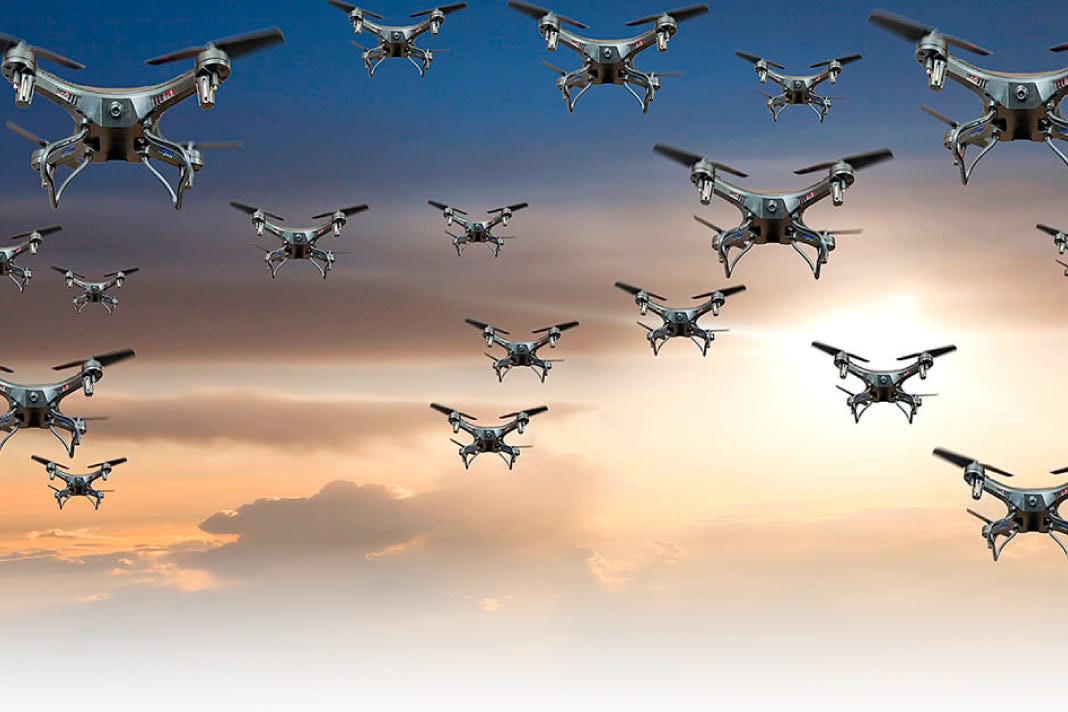How Weaponry Organises Society
Weapons technology sets the parameters of civilization, which might be a problem for the hyper-centralized order the World Economic Forum wants to drag us into.
This post was inspired by a few recent pieces. First, there's Harrison Koehli's essay at the Political Ponerology blog looking at the connection between the growth of complex societies and the evolution of violence, where he describes Peter Turchin's thesis that the primary selective pressure shaping our social order was warfare rather than agriculture. Second, there's Chris Bray's meditations on the World Economic Forum's drive towards a new digital feudalism - you know the drill, you'll own nothing and you'll (damn well pretend to) be happy. Third, there's this description of the next generation, drone-enhanced small unit tactics being developed by the Marine Corps, which I found by way of the always-interesting American Sun. And finally, there's my own recent analysis of America's less than spectacular chances in a great power war (although the connection here is really just that I've had war on the brain).
By the end, I promise, you'll see how it all fits together.
Of all of the above pieces, it's Koehli's that's the most directly relevant. Since I want this piece to be self-contained I'll be repeating some of what he had to say, but I do encourage you to read it as he went in a rather different direction.
We like to imagine that ideas matter - that the pen is mightier than the sword. The great societal advancements, as well as the great human catastrophes, are the result of ideologies, religions, and philosophies that grab hold of the minds of men, inspiring them to acts both heroic and monstrous. While there's certainly a place for ideas (hell, I wouldn't be writing here if I didn't think there wasn't), there are other influences that seem to have an outsize impact. You can think of it as setting the parameters for the varieties of social order that can prosper in a given historical age.
I'm thinking, of course, of technology, and in particular, the technologies of war.
The basic connection is straightforward enough. If your society lacks the ability to stop your neighbours from smashing their way into their territory, breaking your stuff, and making off with your women, it isn't going to last long. Whatever innovations you've developed in agriculture, materials science, social organization, mathematics, astronomy, or underwater basket-weaving are all quite irrelevant next to this very basic fact of life.
If two competing societies have different levels of military technology, the more advanced society will almost always win. Sure, it doesn't always shake out that way - the iron age Norse getting their hairy butts handed to them by the neolithic Skraelings in Vinland come to mind - but these are very much the exception rather than the rule1. An entire civilization of neolithic Mexica getting rolled by a few hundred rowdy gunpowder age Spaniards is more typical.
On the other hand, when two peer societies go to war, all else being equal victory will tend to go to the society that most effectively adapts their tactics to the available technologies. Tactical adaptations don't just mean training your troops in best practices, but include the entire organization of the army. The organization of the military is in turn a function of the organization of the society that produces it. Thus, the society that most effectively organizes itself to adapt to the prevailing military technology will tend to displace the society that does not.
Now, very broadly speaking, we can divide societies into two types: decentralized and centralized. Centralized societies have strict hierarchies, steep wealth gradients, and autocratic systems of governance. Decentralized societies are egalitarian, exhibit relatively little wealth inequality, and tend towards more participatory forms of governance. Obviously, that's a continuum and not a dichotomy.
My thesis here2 is that changes in military technology are a major factor, perhaps the decisive factor, driving an oscillation between these two forms of social organization.
Let's start at the beginning, with our Homo erectus ancestors whose small brains were unable to conceptualize any tool more sophisticated than a hand axe knapped out of whatever flint they could find lying around. I can't prove this, but I'll go out on a limb and guess that their typical social structure was probably a lot like what you'd see in any other group of primates: the largest, strongest, and most aggressive alpha male would keep the females of the tribe for his private harem, because he'd smash in the noggin of anyone who challenged him.

Eventually humans developed the first projectile weapons: spears, atlatls (or spear-throwers), boomerangs, blow-guns, and the bow and arrow. Pretty much any neolithic society you can think of has access to some form of projectile weapons technology. Interesting, neolithic societies also tend to be very egalitarian: they don't tolerate steep Gini coefficients, and they use social technologies like mockery to bring uppity alpha males down a peg or two. Why is this? Well, with projectile weapons, you can kill someone without getting close to him, and that means whatever advantage he has in strength, reach, and mass isn't quite as relevant3.
Projectile weaponry also made hunting a lot more efficient, especially for societies that learned to organize effective hunting parties so they could take down large game such as woolly rhinos, giant sloths, and the ever-iconic mastodon. Hunting and war being close cousins, societies that learned to hunt cooperatively with projectile weapons would naturally go to war using similar tactics.
An important aspect of neolithic projectile weapons technology is that it's relatively easy to manufacture. It was a basic expectation of any adult male tribesman that they could go into the woods, grabs the right sticks and stones, spend some time whittling and carving and knapping around the fire as they shot the shit with their bros, and have his own weapon a few days later4. Now, that doesn't say anything about how easy they were to use, but again a male tribesman basically had one job - know how to kill things - and he more or less spent his life mastering those skills.
So you've got weapons technology that's easy enough to make as to be universally available, and the effective use of which favours large cooperative groups. Result? Egalitarian warrior bands.
Interestingly, as pointed out by Turchin and related by Koehli, the advent of agriculture in the late neolithic does not seem to have led to a precipitous decline in socioeconomic equality. That happened several thousand years later in the bronze age, when suddenly you start seeing these highly centralized, brutally repressive, authoritarian city states along the Mesopotamian model.
So what changed?
My guess is two things: bronze, and the chariot.
A warrior equipped with bronze weapons and armour would make short work of an opponent armed with a sharpened rock on the end of a stick5. Meanwhile, warriors charging into battle on chariots were pretty much unstoppable to infantry units armed with those same flint spears, as well as making much harder targets for archers.
The combination of bronze weapons and armour and horse-drawn chariots was essentially the technological one-two punch that enabled the Aryans, er sorry the Proto-Indo-Europeans, to come flooding out of the Ukraine and conquer essentially the entire known world. Notably, even at the stage when they were unlettered barbarians living on the steppe, they'd already developed a more hierarchical social structure than the settled agrarian societies, dividing themselves into a tripartite order: those who fight, those who pray, and those who work. That basic division of warriors, priests, and labourers pretty much continues to this day.
Now, why would they so divide themselves? My guess is that it's mainly due to resources. Equipping a single warrior with a chariot, bronze armour, and bronze weaponry, is a much taller order than having him wander into the woods to make his own spear out of a piece of rock. Not only is the manufacturing process for bronze rather more involved, but it's an alloy of tin and copper, two metals that don't tend to be found close to one another (that being one of the major drivers of long distance trade in the bronze age). Once you've got the right materials, you still need a skilled smith to turn them from ore into a finished weapon, and that's not a trick you learn in a day. As far as the chariot goes, you need not one but two horses, neither of which is cheap, as well as, once again, the skilled labour necessary to build a large and complicated wooden structure with a lot of moving parts, all of which have to fit together perfectly or it will fall to pieces the first time it hits a bump.
All of that represents a considerable investment for a low-productivity agrarian/pastoralist society. At a guess, maintaining a single charioteer probably required something like a village's worth of peasants.
Societies that didn't make that investment got blitzkrieged by the societies that did. It wasn't what you'd call optional. On the other hand, societies that did make that investment found themselves with a warrior caste equipped with much more potent weaponry than the average peasant, and it didn't take the warriors long (I'm guessing, oh, five minutes or so) to figure out that they could just take whatever they needed. In fact, since the warriors who did precisely that ended up with better kit, they'd have a better chance of prevailing against other charioteers.
Thus, once chariots and bronze enter the picture, you've got all the selective pressures pointing in the direction of centralization and hierarchy. And, not surprisingly, this is when we start to see the priestly slave states with god-kings presiding over heaving masses of malnourished peasants fed on a subsistence diet of mildly alcoholic gruel, kept in line by a mixture of theocratic micro-management and sheer bloody terror.
War during that period was interesting. They'd round up large armies of peasants and shove spears into their hands, but infantry seemed to serve more as spectators, whose main job was trying their best to look fierce despite their probably less than impressive physiques. The real action was between the aristocrats riding around on chariots challenging one another to duels. The spear-bearer peasants were more or less expected to stand there and shout enthusiastically.
Enter the iron age. Metallurgy has now advanced to the point that rather than having to make weapons out of a relatively difficult alloy whose materials have to be sourced from the far corners of the map, they can be made from an abundantly available mineral. Suddenly, equipping large numbers of infantry with metal weapons and armour becomes relatively easy.
Warfare now moves on from the era of the chariot to the era of the phalanx and, later, the legion. From the point of view of bronze age militaries consisting of masses of untrained peasant conscripts providing an audience for peacocking aristocrats zipping about in their chariots - i.e. pretty much the model Xerxes was using when he invaded Hellas - the phalanx was a weird and terrifying sight: a tight knot of heavily armoured madmen sprinting across the battlefield to smash into the enemy ranks like a mailed fist, all of them trained to provide mutual protection for one another behind shield walls bristling with spears, such that getting at any one of them was probably very frustrating ... none of which prevented them from getting at you.

On top of that, the physical quality of the hoplites of the phalanx was far superior to that of the poor wretches in the Persian military. The Greeks had been fed a steady diet of lamb hecatombs from birth, and then educated in gymnasia which offered a cutting edge combination of weight-lifting, calisthenics, and intellectual training. They were strong, they were fast, and they were smart. The Greeks weren't only equipped with superior technology, and they hadn't only adapted their tactics to make the best possible use of that technology, they'd altered their entire social order such that it would produce the human type most capable of effectively serving in their military formations.
Persia, for all that it was vastly larger and wealthier than the Hellenic backwater, never stood a chance. Not long after Xerxes was sent home with his tail between his legs, Alexander rounded up the fractious Greeks and sicced them on the Persian empire, conquering it in a matter of years6.
Ultimately the Romans supplanted the Greeks, but the military technology they used, and the tactics and social organization they adopted (at least during the republican period) weren't all that different in kind. They really just beat the Greeks at their own game.
So what do we see? A military technology that favoured large armies of well-equipped, well-trained soldiers, and that absolutely required them to be in top physical and mental condition. Result? The societies that dominated were those that adopted a much more egalitarian economic structure, such that a larger fraction of the society had access to the resources necessary to make effective use of that technology on the battlefield. This furthermore corresponded to a more egalitarian political order, for the obvious reason that men who are on a level physically, intellectually, economically, and militarily, aren't the kind of men who easily submit to an alpha.
That basic dynamic lasted right up until the invention of the stirrup. Suddenly the invincible legions were getting rekt by massed cavalry charges, and the military paradigm changed yet again, reverting to something much closer to the aristocratic chariot-centred armies of the bad old days. Battlefield dominance passed from the hoplite/legionary model - a soldier whose equipment could be provided by roughly the economic output of a household - to the medieval knight, whose horse and extensive armour required an entire village to support. Moreover, to really master the weapons technology of the age, a knight pretty much had to train continuously from boyhood.

Result: the constitutional democracies and republics of antiquity gave way to the divine right of kings and the politics of fealty. At the same time, the political and economic stratification led to a physical differentiation, with masses of underfed peasants and a well-fed, taller, stronger nobility. Exactly the pattern we saw with the introduction of the chariot and the rise of the god-kings.
That lasted right up until the next major battlefield innovation: gunpowder. In an echo of the first appearance of projectile weapons back in the neolithic, suddenly any peasant who'd spent a week learning how to point an arquebus in vaguely the right direction could not just unhorse a knight but send a murderous ball of lead straight through his expensive breastplate.

Over the next couple of centuries, as firearms technology developed, massed infantry once again came to dominate the battlefield, with the aristocratic cavalry being steadily demoted from their former pride of place to serve as more or less a reconnaissance and support force. The apex of firearms came with WWI and the mass use of the machine-gun, which put a firm period to several thousand years of cavalry warfare.
The rise of firearms coincided with democratic systems displacing hereditary monarchies more or less everywhere in the world. Whichever society could most effectively mobilize large numbers of aggressive young men, and get them to march in formation through impenetrable clouds of gunpowder smoke while cannonballs exploded around them and their buddies' shattered teeth dug into their cheeks, would be the one who won the war. That's why Napoleon damn near conquered Europe: the rallying cry of Liberte, Egalite, Fraternite was so inspiring to the French peasant that they signed on for the army in enthusiastic droves. While Napoleon ultimately lost, few would argue that the ideals that animated the French Revolution did not ultimately succeed.
The worm turned again with the Great War and the advent of aerial and mechanized warfare. It was the development of the tank that cracked the deadlock of the trenches, and when World War II reared its ugly head these technologies dominated the battlefield. The combination of aerial bombardment and armoured, highly mobile artillery vehicles proved unbeatable. Germany's development of blitzkrieg tactics made the best possible use of the latter, and they almost won the war in the early days on that basis alone. The Allies' deployment of strategic bombers, however, ultimately proved more important. The American way of war - achieve air dominance, bomb the enemy until the rubble bounces, and then send in tank columns with infantry support to mop up whatever's left - hasn't really changed since, for the simple reason that there isn't really a good answer to it.
Neither a supersonic fighter jet nor a main battle tank is something you just whip up in your garage. Nor are they technologies that you learn to use after a weekend course. Each of these are extraordinarily expensive pieces of equipment that require highly trained specialists to operate. An F-35 retails for a cool $110 million USD. For comparison, the median US household brings in just shy of $70k a year. So, it takes the income equivalent of 1400 US households to purchase one F-35. The operating cost of an F-35 is something like $34k per flight hour, meaning that it takes the income equivalent of a household over an entire year to keep one in the air for less than two hours.
We're essentially right back to the days of it taking a large village to support a knight; in fact, we're probably well beyond that, in terms of the peasant:warrior elite ratio.
And, once again, the pattern holds. Previously democratic societies with relatively low levels of wealth inequality have steadily given way to the vertically integrated managerialism and billionaire oligarchy we inhabit today. Once prized liberties have been steadily eroded by increasingly repressive regulations. A priestly class micromanages our every word and thought. An economy based on small, independent businesses has been replaced by one dominated by massive, global corporations; the average citizen is no longer a yeoman farmer and shop-keeper, master of his domain and captain of his destiny, but a powerless employee endlessly henpecked by HR and liable to be fired for the smallest offense. Simultaneously, the physical and intellectual quality of the average citizen has declined precipitously, for the simple reason that it is no longer so essential that as many males as possible be top-quality soldier material.
So what comes next?
It's pretty clear what the globalist faction wants, and obvious why they want it: to further centralize control and wealth. They openly tell us this: global governance, you vill own nothing, you vill live in ze pod, you vill eat ze bugs. You know the drill.
And, right now, here at the apex of their power, it's pretty hard to see how that can be stopped.
Only, the evolution of military technology hasn't stopped.
The next stage in weapons tech is looking to be the drone. I don't mean the Predator drone - those expensive behemoths are just the first stage in the application of drones to warfare, and will be relics soon enough. And I don't mean the Boston Dynamics variety of dog robot, although they may play a role.
I'm talking about your standard, out of the box, cheap as dirt quadrotor.
The military applications of this are beyond obvious. I think a lot of us saw it as soon as we started seeing them flitting around. Stick some explosives on one of those badboys and you've got a highly manoeuvrable mobile bomb. It's extremely difficult to intercept, being small, fast, and able to change trajectories on a dime. It can be guided to its target with incredible precision. Forget trying to destroy the entire tank: all you need to do is disable it, and a relatively small explosion in just the right spot will do that very effectively. The same applies to more or less any piece of expensive industrial technology: there's always a critical point that will disable it (and probably make repair very expensive), and with weaponized drones it's like you're rolling a 20 every time.
The Marine Corps piece I linked at the beginning (here it is again, lazybones) described an exercise in which a platoon equipped with drone technology was able to take a hardened fortification in a ridiculously short period of time and with a fraction of the usual three-to-one force ratio that has been the rule of thumb for storming defended positions throughout the era of mechanized warfare. Now, sure, the enemy force wasn't so equipped, so how realistic is this really? But it's a lot more obvious how drones can be deployed offensively as compared to defensively. At a guess, you probably need quite a few more defensive drones to stop an incoming drone swarm, because only one of the deadly little bastards needs to get through to get its murderous little job done. It's a similar problem faced by anti-missile defenses: you pretty much need a missile to shoot down a missile, and that isn't easy.
While the US has been dragging its heels updating its tactical doctrine and force structure (and social order) to make really effective use of drone warfare - exactly as you'd expect for a sclerotic, crumbling empire from the previous historical age, by the way - other militaries out on the imperial periphery have already started making effective use of drones.
The recent war between Armenia and Azerbaijan saw the latter incorporate drones, primarily for reconnaissance, into their tactics at the small-unit level, with the result that they ran circles around the Armenians and won the war handily in short order.
An attack by the Houthis on Saudi oil refineries a few years back used a swarm of explosive drones to knock a considerable fraction of the world's oil infrastructure offline, and at considerably less cost to the Houthis than to the Saudis (and to the world economy). That's one of the indicators of a very effective military technology: if you can destroy $100 worth of enemy infrastructure with an investment of $1, it doesn't matter if they have 99x more available resources than you do.
Drone warfare is incredibly cheap. It is very easy to use. Especially as 3D printing technology comes into its own, we're going to enter an era where individual households can build their own weaponized drones without having to even tell anyone what they're doing7. Infantry equipped with drones can probably make short work of enemy armour simply by knocking out critical components, while also achieving extraordinarily levels of battlefield mobility because every hovering bomb they throw up is also another set of eyes and ears, with all of that information being fed back to command staff ... and probably communicated far more widely than that. My guess is that the armies that end up making the best use of this technology will be the ones that push as much initiative and responsibility out to the edges of the rank structure; in other words, rather than private soldiers being dumb grunts expected to shut up and take orders, no matter how stupid, they'll be expected to understand the goals and improvise on their own in an ad hoc fashion to advance those goals.
Now, what kind of social order produces the kinds of humans serving as the ideal recruiting pool for the independent, quick-thinking violence entrepreneurs most likely to prosper in the hellish buzz of the drone-swarm battlespace?
Is it the highly centralized, micromanaged vision of the WEF, filled with neo-peasants subsisting on bug gruel who don't dare speak out of turn lest their social credit score be docked for committing an anti-science hate speech?
Or is it a society that is itself highly decentralized, that adopts an egalitarian economic system that provides a healthy living to the maximum number of people so as to have as many smart, capable men as it can, and raises its boys to be fiercely independent and strong in mind and body?
The maddening, hellish buzz of freedom.
I think the answer is pretty obvious.
And I think that's a good reason for hope.
In the case of the Norse they were vastly outnumbered, most of their society had no idea they even had an outpost in North America (or that North America even existed) since the settlers had kept the entire expedition something of a secret, and their supply lines were over-extended: importing things to Vinland by way of Greenland by way of Iceland by way of Norway was something of an operation. Thus, when the settlement was sent packing to Valhalla, the few who knew about it said, eh, fuck it, juice ain't worth the squeeze.
Which isn't original to me, I hasten to add. I read this somewhere years ago. I'm just too lazy to look it up. Do your own research, as they say.
I've come across the suggestion that neanderthals were wiped out by Cro-Magnon because the latter could kill from a distance and the former could not, meaning the fact that a neanderthal could crush a linebacker's ribs by flexing didn't count for much.
Why, yes, the job description of our hunter-gatherer ancestors is what we do for recreation. Ah, progress.
Although the advantage probably wasn't as great as you'd think: flint is extraordinarily sharp, and by the late neolithic warriors were equipping themselves with boar tusk armour that was actually pretty resilient. Cool overview on bronze age armour by the fantasy author Dan Davis here.
You can see a great overview of Alexander's glorious life here, by the always thoughtful and interesting content creator Asha Logos.
And the senile fart in the White House has his depends in a twist over 'ghost guns'. LOL.















A revived form of civic militarism (military prowess sustained by egalitarian social forms, group cohesion and genuine efforts to develop human capital) has much to recommend it. But state of the art weaponry requires the fabrication of computer chips, the extraction and refinement of rare earths and the launch and maintenance of satellites. These would pose extraordinary difficulties for decentralised, egalitarian, systems.
Furthermore, the ability to develop and deploy advanced weapons systems requires the application of advanced STEM skills. There is nothing egalitarian about STEM.
In the long run military advantage will deservedly go to the side with the deepest reservoirs of quality human capital.
The ruling caste in the US currently thinks it can maintain planetary supremacy with a technocracy recruited from the Ivy League supplemented with Asian migration while it constrains the development of the legacy population through maleducation, infotainment, cannabis and austerity economics. This situation can’t go on forever. The latest Russian air defence systems are extinguishing Anglo-globalist air supremacy, rendering the standard NATO military model obsolete. Change is on its way.
The immediate future may see the US cut a deal with rival oligarchies, while attempting to maintain the present social system. A degree of latitude will be extended to those portions of the population needed to ensure sufficient loyalty and capacity to die for the state, but it will all be a matter of degree.
You might be better off considering whether technologies benefit the attacker or defender more, and the relationship between the state, the people and opposing states. The important part with the latter considerations is that opposing states are ok with leveling each other's cities and populations (generally) but a state fighting its own people is generally not. You can't rule dead people, or gain wealth from leveled cities after all, so you need to get the people to give up fighting without doing anything too destructive.
Drones benefit the offence more than defense for just the reasons you describe. Between opposing states the benefit is non-obvious if they both have them, but it is not obvious whether they benefit the state more than the people in a conflict between the two. On the one hand people can use drones to harass and damage the generally more expensive state military investments. On the other hand there are other fingers. Specifically, there are a lot of government employees whose only job is to keep drones flying around observing people and either reporting or actively attacking violators. They get paid to keep their fingers busy flying drones, while citizens are taking time away from their lives to do so.
Speaking of drones, shotgun based weapons are very effective against them. It is a move away from the normal round based rifled ammunition we see dominating today, but I suspect that if drones become a big issue active countermeasures such as are used by tanks to stop missiles today will become common place. Imagine an auto-tracking machine shotgun that can hold a few thousand rounds spraying down a swarm of drones (or infantry.)